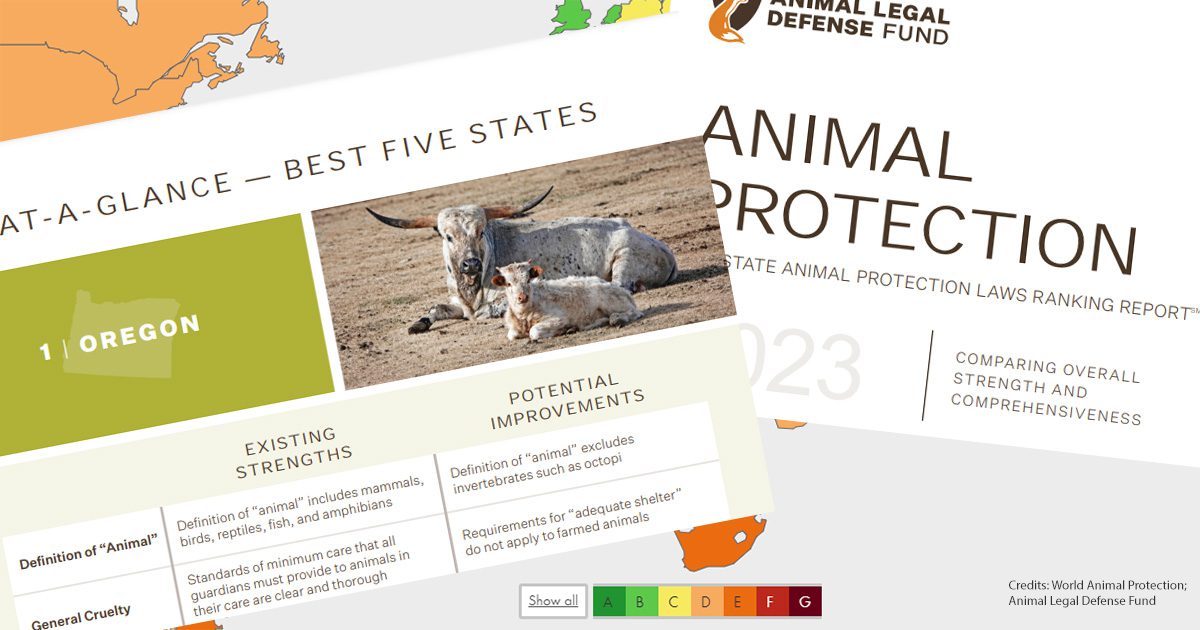
Jun 10, 2024 Do Lists Improve Animal Protection?
It has been suggested that humans should be categorized as the species Homo classification rather than Homo sapiens because we are so attracted to making lists and developing categories to simplify and organize the world around us. For example, journalists recognize that the audience will pay more attention to stories that rank the best places to live or that promise some other listing or ranking of topics. Studies of internet use indicate that pages with lists or featuring articles about lists receive more clicks. Lists, as exemplified by dictionaries, encyclopedias, and biological classification, help us order the chaos of the sights, smells, and impressions surrounding us. A 2013 article in the New Yorker provides reasons why our brains are attracted to lists.
Hence, it is no surprise that the Animal Legal Defense Fund (ALDF) has, since 2006, distributed a report ranking the best and worst states in the USA according to the comprehensiveness of their animal protection legislation. In 2006, the first effort consisted of a few pages reporting that the best animal protection laws were found in California, Illinois, Maine, Michigan, and Oregon, while the worst were found in Hawaii, Idaho, Kentucky, North Dakota, and Utah. In 2017, Kentucky, North Dakota, and Utah were still in the bottom five, but Hawaii had moved up to 35, and Idaho was at 42. In the 2023 rankings, Oregon, Illinois, and Maine were joined by Massachusetts and Colorado in the top five states, while Alabama and South Carolina joined Kentucky, Idaho, and North Dakota in the bottom five.
From 2006 to 2023, the rankings report underwent significant upgrades in the evaluation process and appearance. The 2006 report is a brief black-and-white mimeographed document, whereas the 2023 report is a 34-page color publication full of attractive graphics and pretty photographs of animals.
Just over ten years ago, World Animal Protection set out to produce a report on animal protection activity and status worldwide. The first Animal Protection Index was published in 2014 and featured fifty countries on five continents ranked from A (the top grade) to G. No countries received an A; only two (Azerbaijan and Iran) received a G ranking. However, there were some surprises in the rankings. For example, Canada and the USA received D grades, Mexico received a C., Tanzania and Kenya received D rankings in Africa, and South Africa received an E.
One of the reasons why the USA and Canada received a lower grade than Mexico is because the Animal Protection Index emphasizes national legislation. In contrast, much of the animal protection legislation in the USA and Canada is state or province-based. In the USA, companion animal and anti-cruelty legislation is virtually all state-based because the tension between federal and state legislative authority influences what laws the Federal Government can pass. Simplistically, the Federal government can pass laws to protect and defend the nation, to ensure public health, and to regulate interstate commerce. Preventing animal cruelty does not qualify under these three criteria, and all cruelty legislation is state-based. For example, only four states had felony-level anti-cruelty legislation in 1984. Today, all fifty states have such legislation, although the provisions may differ from one state to the next. Because the Animal Protection Index does not consider state or provincial legislation and municipal legislation, local legislation protecting animals is not incorporated into the overall national grades of the USA, Canada, Australia, or any other countries with regional legislative bodies.
In the African example, the higher grades for Kenya and Tanzania are problematic. South Africa is one of the few countries with national legislation authorizing the animal protection movement. In 2016, the South African Constitutional Court ruled that under the 1993 Prevention of Cruelty Act, The National Council of SPCAs (NSPCA) has the statutory power to institute private prosecutions. The NSPCA is very active in pursuing animal cruelty issues throughout the country. Because of its activities, any objective appraisal of animal protection policy in the three countries would rank South Africa above either Kenya or Tanzania.
Efforts to assess animal protection policies in different countries will always be challenging. Constructing the Animal Protection Index was a tremendous effort by World Animal Protection. Still, one should not be too literal in assuming the letter grades accurately reflect animal protection status and political clout in any country. According to Google Scholar, over 450 academic projects have cited the Animal Protection Index, and some have relied on it as an accurate measure of animal protection activity or status in the 50 evaluated countries (for example, see Magalhaes & Zhang, 2019). Considering the abovementioned issues, scholars using the API should recognize its shortcomings.


